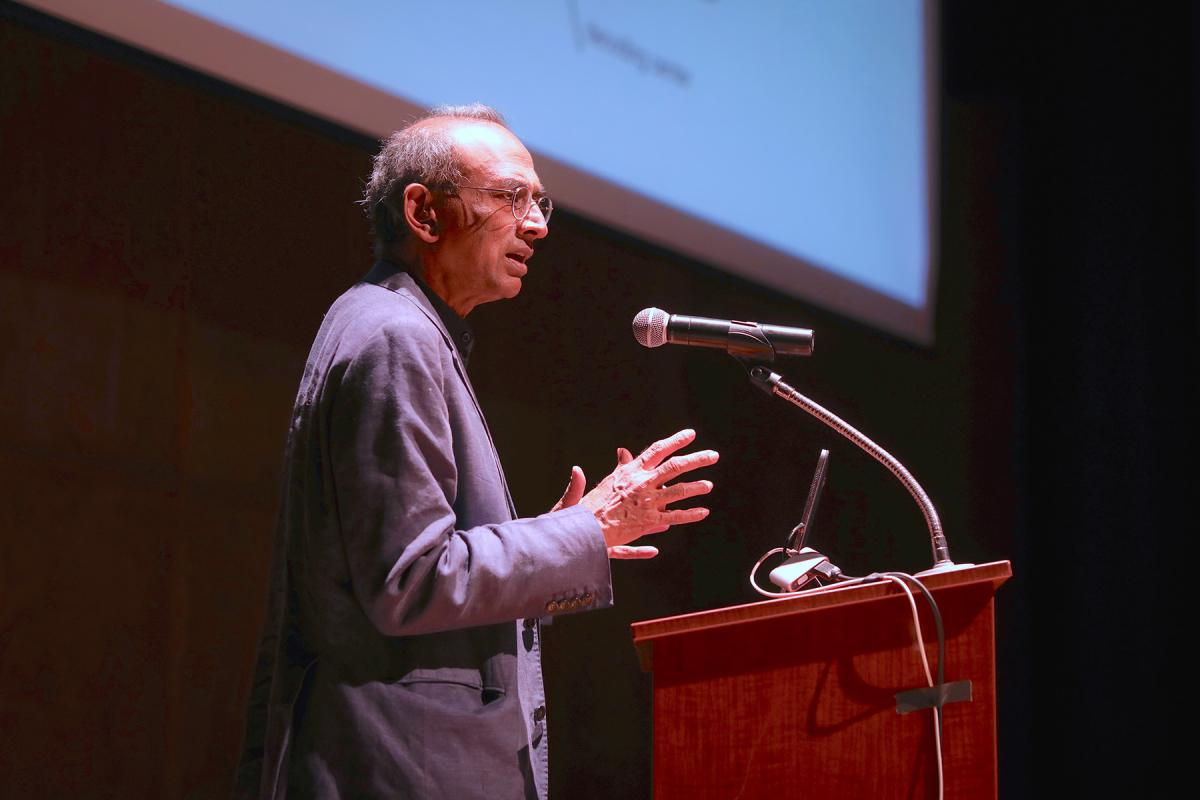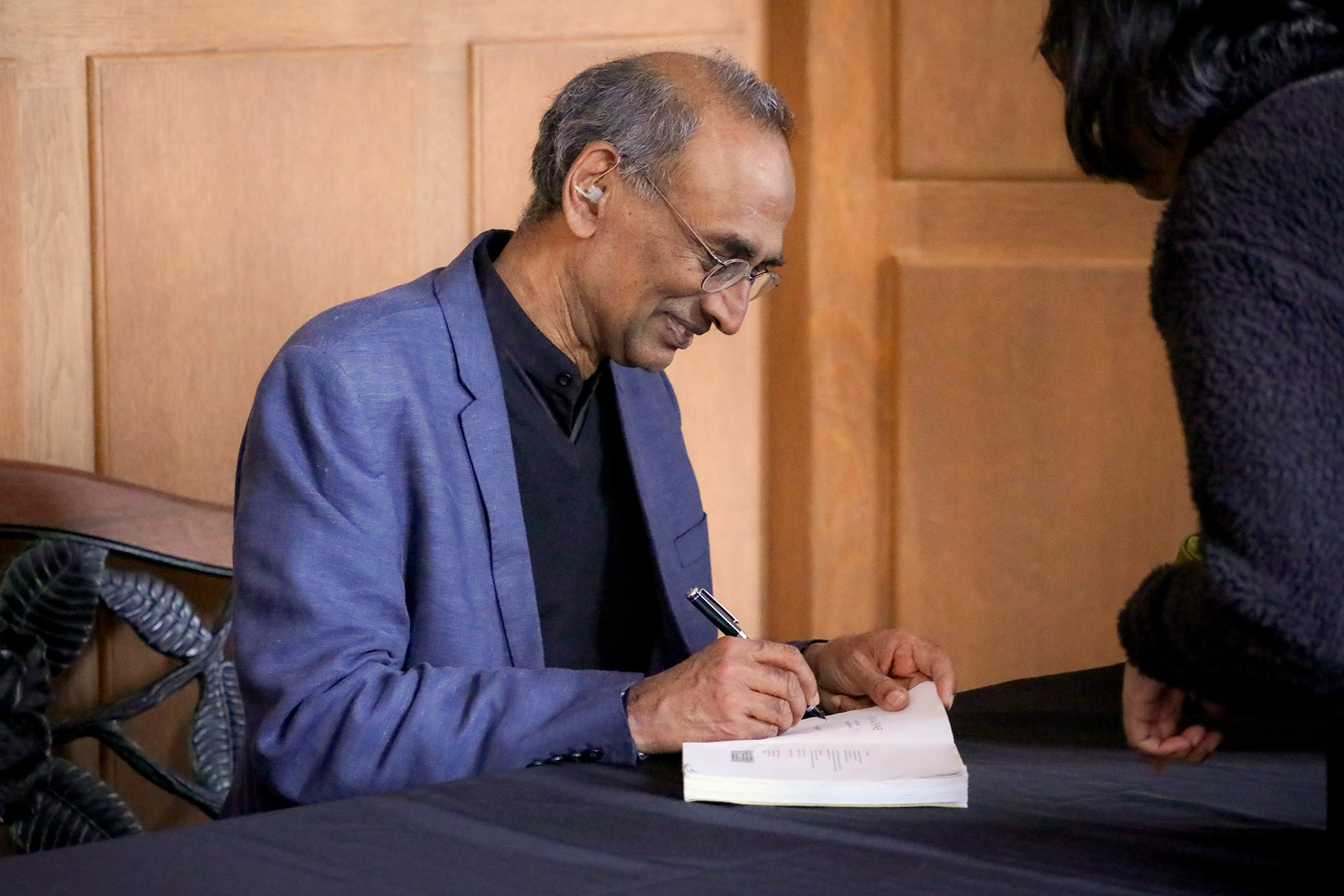Nobel Laureate Venki Ramakrishnan discusses ribosomes, resilience during FSU public lecture

Florida State University’s Institute of Molecular Biophysics hosted Venkatraman “Venki” Ramakrishnan, a world-renowned structural biologist and Nobel Prize winner in chemistry Jan. 22 for a wide-ranging lecture covering his research on the ribosome, proteins and crystal structures punctuated by his personal story of persistence and passion.
After the lecture “My Adventures in the Ribosome,” Ramakrishnan met with faculty and students and signed copies of his book, “Gene Machine: The Race to Decipher the Secrets of the Ribosome.”
“My lab studies the structure and function of the ribosome, which is an ancient molecule in all cells ranging from bacteria to humans,” Ramakrishnan said. “Bacterial ribosomes are the target of many useful antibiotics. However, going back in history, there has always been a pattern of antibiotic resistance or resistance of cells to medicine. Understanding the ribosome’s structure reveals how antibiotics bind to them, which allows us to understand antibiotic function and how the ribosome works. It’s a very fundamental, important molecule that has many ramifications across the entire field.”
After earning his doctoral degree in theoretical physics at age 24, Ramakrishnan was inspired by the mysteries of biology and decided to dedicate his learning to the field of molecular biology. While not possessing any biological science background, he was offered a postdoctoral fellowship at Yale University by Thomas Steitz, a biochemist with whom Ramakrishnan would eventually share a Nobel Prize for their work on the ribosome. Ramakrishnan did not accept the offer but capitalized on this newfound passion and earned his degree in biology at the University of California, San Diego, in 1978 before returning to Yale for a postdoctoral position in chemistry.

“There were so many twists and turns in my journey,” Ramakrishnan said. “I’m so glad I kept my options open. Earning the Nobel Prize wasn’t an end goal, but it vindicated my decision to go into biology and give science another shot. Some of the most important things I’ve learned include not being afraid to ask for help and keeping in mind that everyone has imposter syndrome, and the most important thing to do is to keep doing your own thing.”
In addition to being a Nobel Laureate, Ramakrishnan was knighted by Queen Elizabeth II in the 2012 New Year Honours for his contributions to molecular biology in 2012, and he also served as president of the Royal Society, the U.K.’s National Academy of Sciences and the world’s oldest independent scientific academy, from November 2015 until November 2020. In Cambridge, England, he worked as a group leader of the Medical Research Council Laboratory of Molecular Biology, one of the world’s leading biological science research institutes, for more than 20 years.
“For some of my students, this is a full circle moment. They grew up reading about Venki’s journey and being inspired by it,” said Hong Li, director of FSU’s Institute of Molecular Biophysics and professor of chemistry and biochemistry. “His story is one of persistence, of how he achieved the highest honor in science by taking risks in an unfamiliar territory and how he contributed in a way that has provided essential foundational information about one of the most important molecules in our bodily functions. We’re so thankful to have him visit.”

The 2009 Nobel Prize in Chemistry was awarded to Ramakrishnan and biochemists Steitz and Ada Yonath for their work in researching the ribosome, describing its three-dimensional atomic structure and explaining the mechanism of protein production. Understanding how proteins are synthesized by ribosomes, which serve as the protein factories of cells, not only helps in treating diseases but also forms the backbone of molecular biology experimental systems, including forensic DNA analysis, gene therapy and more.
Ramakrishnan is also a member of the U.S. National Academy of Sciences, a foreign member of the Indian National Science Academy, a member of the American Philosophical Society, a member of the German National Academy of Sciences Leopoldina and a member of the European Molecular Biology organization. He has earned many awards and medals worldwide for his interdisciplinary research spanning biology, physics, chemistry and molecular biophysics.
“We are honored to host Venki Ramakrishnan for this campus visit, and what a great experience this is for the FSU and Tallahassee communities,” said College of Arts and Sciences Dean Sam Huckaba. “He provides a shining example of the power of interdisciplinary research, and his significant contributions display why science research is moving so forcefully in that direction.”
